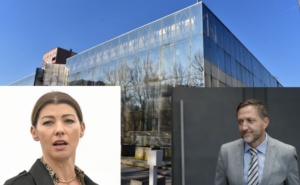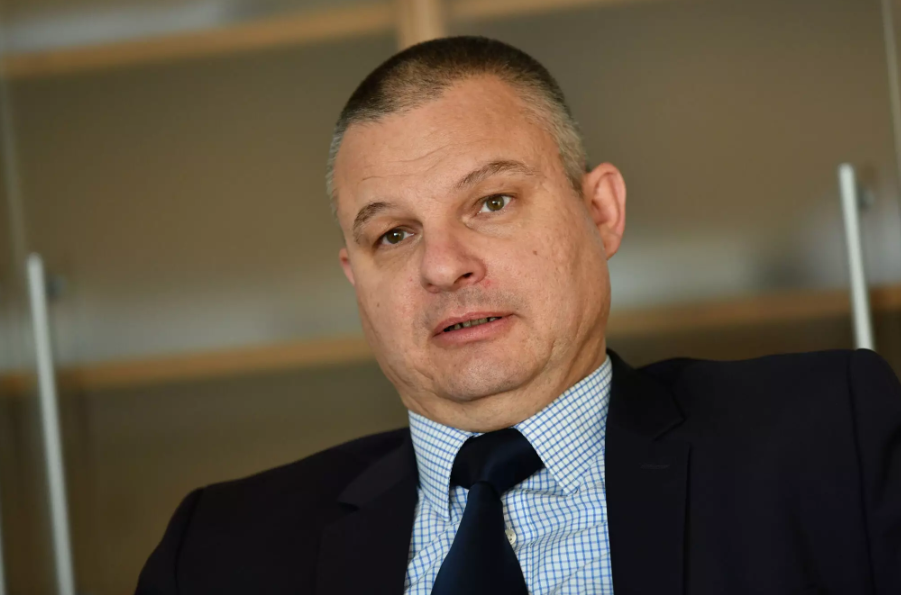After a little more than a year since the house searches related to the purchase of the building at 51 Litijska Street in Ljubljana, the head of the National Bureau of Investigation (NPU), Darko Muženič, has stepped in front of the cameras again. Just over a year ago, Muženič created a media spectacle when he said that 13 people were suspected in the scandal of the purchase of the building at Litijska 51 in Ljubljana. At that time, he explicitly said that it was suspected that the suspects had committed a crime in the purchase of the property by preparing documentation that did not reflect the true state of the actual property.
At a press conference at the time, Darko Muženič stated unequivocally that “the suspects had obtained a material benefit of 3.4 million euros.” However, at the time, Muženič and the investigators did not include the signatory of the purchase contract, the then-Minister of Justice, Dominika Švarc Pipan, or her State Secretary Igor Šoltes, in the investigation. The police investigation at that time and throughout the year avoided the key players in the purchase of the building, namely the former Secretary-General of the Social Democrats party (Socialni demokrati – SD), Klemen Žibert, the Minister of Finance, Klemen Boštjančič, his two Secretaries of State, Saša Jazbec and Gordana Pipan, and, of course, one of the key players and coordinators of the purchase and financial activities, Klemen Babnik, the Head of Office of the Minister of Finance.
According to our information, Muženič and the investigators Jasna Fikfak and Gregor Izda interviewed only those suspects and other persons they considered not to be able to harm key political and operational figures in the purchase of the building at 51 Litijska Street. Moreover, as Jasna Fikfak apparently revealed with her statements, the National Bureau of Investigation had the whole story or political construct and the course of the “investigations” prepared from the very beginning. As we managed to find out, Fikfak even explained to some of the investigators that Šoltes and Švarc Pipan simply knew nothing and had nothing to do with the purchase. The investigative body, which is clearly working under the heavy hand of the ruling politicians, is doing everything in its power to conceal the key facts of the purchase and to whitewash the names of the political players, despite the facts being made public in the media and the clear legal roles, powers and responsibilities they had in the deal.

What is more, it is a blatant subordination of the law enforcement and investigative authorities, and an abuse of these institutions for political purposes. Sources say that Švarc Pipan’s successor, the current Minister of Justice, Andreja Katič, has focused all her efforts on protecting the key political players and bringing discredit upon the employees. Shortly after taking office, she commissioned a regular internal audit of the purchase of the building, which, immediately after receiving the final text of the audit on her desk, she said that she had not commissioned, and later that she did not remember doing so. But we journalists were quick to expose her lies. The Internal Auditor in the case, who was the first to point out the illegal behaviour of political decision-makers, was subjected to a stampede, a media lynching, a revocation of her powers and, of course, a warning before her regular dismissal.
The audit was carried out by a firm that was also doing business for Golob’s GEN-I
At the request of Boštjančič and Prime Minister Robert Golob, Katič launched another audit – namely, a forensic investigation. Katič carried out the entire process of selecting an external audit firm in less than three days, and the audit was then carried out by Ernst&Young of Ljubljana, which was also doing business for Golob’s GEN-I energy company. Katič and the auditors at Ernst&Young came up with the idea of conducting the audit as a secret operation, as the entire audit process was defined in a message to the employees as secret. What is more, they even summoned the employees to secret locations for interviews by means of secret invitations. All this in the spirit of the revolutionary years of a bygone regime, which is, of course, ideologically close to the main actors in the Litijska affair.
This was followed by numerous attempts to show irregularities in the size and condition of the building, for which the employees were also allegedly responsible. This was done in a way that made it seem as if the Litijska building was in another galaxy and that it would take several light years to go see it. But even the expert opinions commissioned later showed that the political actors were wrong. Apparently dissatisfied with the results of the internal audit, the forensic investigation and the expert opinions, Katič, Boštjančič and Golob brought the whole story to the Budget Supervision Office, which is under the direct command of Finance Minister Boštjančič. The Supervision Office conducted some sort of a revision of the internal audit per the Minister’s instructions.
Muženič prevented the publication of the internal audit report
They published the conclusions of their work as credible, despite the fact that the report states that they did not have all the necessary documentation and that they did not conduct a single interview with the internal auditor, Suzana Hötzl. Muženič, apparently on his own initiative and suspected of having exceeded his powers, prevented the publication of the internal audit report and the report of the Ernst & Young forensic investigation. Apparently, all that was left for Muženič’s National Bureau of Investigation to do was to start a new political-media spin with Fikfak and Izda, and thus formally absolve their bosses of any responsibility.
In another unconvincing public appearance on Monday, Muženič revealed that after a year of investigation, four natural persons and one legal entity had been indicted and that the unlawful financial gain was said to amount to 2.9 million euros. It is not clear what mathematics was used, nor is it clear why the key players in this story – Dominika Švarc Pipan, Igor Šoltes, Klemen Žibert, Finance Minister Klemen Boštjančič, Saša Jazbec, Gordana Pipan, or Klemen Babnik were not on the list of those responsible and suspected. At Monday’s press conference, Muženič did not talk about their agreements, which have been proven in writing and made public on several occasions, and the illegally secured budget money amounting to 6.5 million euros, which has even been confirmed to be illegal by the auditors of the Court of Audit of the Republic of Slovenia.
Both the National Bureau of Investigation and the prosecutor’s office remain silent on the role of Ljubljana Mayor Janković
Both the National Bureau of Investigation and the prosecutor’s office have been turning a blind eye all year to the role of Ljubljana Mayor Zoran Janković in all of this. Practically overnight, the Municipality of Ljubljana provided the seller with all the necessary documents, including a declaration that the Municipality of Ljubljana waived its pre-emption right to the building at 51 Litijska Street. Such a quick intervention was only possible at the request of the top players. However, Muženič said that “the two suspects took care and adapted the text of the public call for non-binding offers so that the building at 51 Litijska Street in Ljubljana was the most suitable for the conditions.” We have been able to verify this claim, and the facts show that the two suspects did not write the text of the public call for non-binding offers at all.

At the same time, it is a fact that this was part of the process of verifying the state of supply on the commercial real estate market. The company Monetic, d.,o.,o. also submitted a bid in response to the call for tenders – for the Metalka building. Their offer was 20 million euros for premises in practically the same condition as the building on Litijska Street. The Ministry would also have to allocate a hefty budget, estimated at almost 10 million euros, for the renovation and all the necessary installations, so the total cost of Metalka would be around 30 million euros. Muženič forgot to point out the fact, which the National Bureau of Investigation had also cleverly concealed, that it was Boštjančič who, during his temporary leadership of the Ministry of Public Administration, offered this building to Švarc Pipan for the premises of the Ministry of Justice.
The total cost of the Litijska project, including comprehensive renovation, is estimated at around 12 million euros
At the time, the Ministry of Public Administration was in talks with Sebastjan Vežnaver to buy the building, as mentioned – for 17 million euros. In the end, practically the same people bought it for 7.7 million euros. The total price for the Litijska building, however, is estimated at around 12 million, which is considerably less than the 17 million previously requested and the 30 million for the Metalka building, including the complete renovation. All that remains are accusations of collusion between officials in the deal, and Muženič’s press statement from Monday shows that the 13 suspects did not split the fabled 3.9 million euros more than a year ago after all. The fact that their lives are practically ruined because of his pompous statements is no longer anyone’s concern today. Nor is there any talk anymore of officials correcting and falsifying data and misrepresenting facts about the building.
So where have these “facts” from just over a year ago gone? Švarc Pipan and Muženič, who were joined by Finance Minister Boštjančič, explained loudly that the “undisputed facts” pointed to an organised criminal group of 13 persons. This mafia grouping, which is apparently more skilful than any of the Balkan clans that Muženič has been pursuing to no avail, is also said not to exist. With all this, the main actors in this story, who had secured the budget for the purchase of the building and had held several cabinet meetings in just a few days to carry out the deal, and who had finally signed the purchase contract and transferred the funds to the seller, disappeared.

The case is in the hands of the regime’s prosecutor Valenčič, who is also prosecuting the leader of the opposition
The case has been handed over to the Specialised State Prosecutor’s Office and is thus in the hands of the regime-controlled prosecutor Boštjan Valenčič, who is also prosecuting the leader of the opposition in the politically instigated Trenta affair. On Monday, Minister Katič said that she “believes that the prosecutor’s office is independent in its work and that it will continue to carry out its tasks independently and autonomously.” This statement already gives an indication of how the prosecutor will act in the future, as he has apparently been able to defend all the key political players in this affair in his work directing the pre-trial proceedings. On Monday, however, Katič already publicly demanded a resolution of the case, indicating as a politician that the case must be brought to a conclusion in court. Despite the fact that the prosecutor has at least two other options.
It is worth pointing out, however, that according to our source, Prosecutor Valenčič recently explained in his circle that he is under severe political pressure regarding the Litijska affair. This is clearly a serious case, which is being played out through political-justice channels known mainly from mafia-dominated countries. Katič is clearly acting like her close friend and confidant Goran Klemenčič, former Minister of Justice, who said a few years ago that “if the Bavčar case becomes time-barred, heads will roll in the judiciary.”
Klemenčič and Muženič have been close friends for many years
It is also important to note that Klemenčič and Muženič have also been close friends for many years now. In order to confirm the independence of the prosecutor’s office, the public expects an independent investigation into the roles and responsibilities of Dominika Švarc Pipan, Igor Šoltes, Klemen Žibert, Finance Minister Klemen Boštjančič, Saša Jazbec, Gordana Pipan, Klemen Babnik and, of course, the Mayor of Ljubljana, Zoran Janković, which was also pointed out by the leader of the opposition, Janez Janša, in his response.
Sara Kovač


